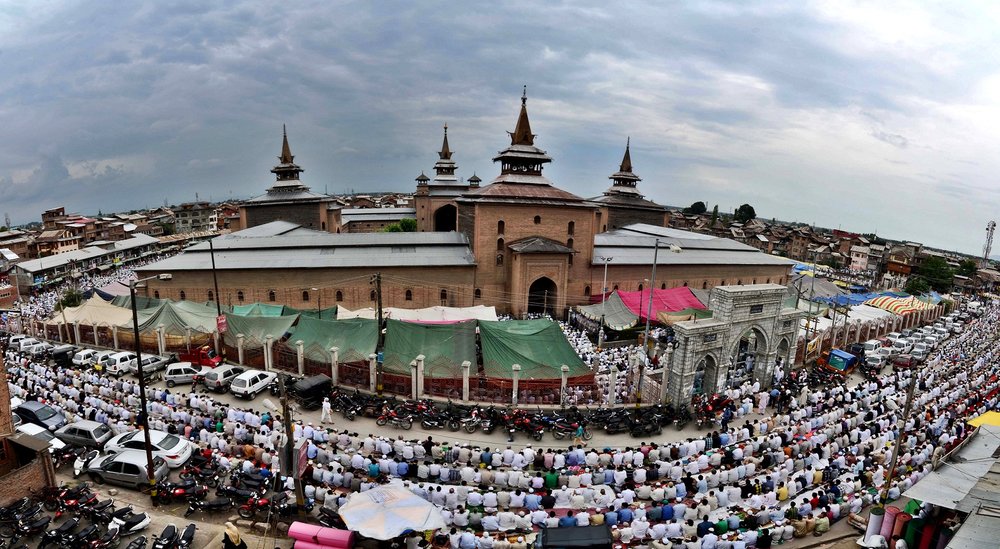Waving of ISIS flag in Kashmir’s biggest mosque sparks protest, condemnation

TEHRAN - Days after some masked men barged inside the biggest mosque in Indian-controlled-Kashmir and unfurled the flag of ISIS on the pulpit of the mosque, a protest was held on Friday across the valley.
A massive protest against the ‘desecration’ of Jamia Masjid saw participation of separatist leaders, civil society activists, religious clerics, representatives of trade bodies and students, who slammed the terrorist group’s sympathizers in the region.
The incident took place last week when the masked men entered the mosque after Friday prayers and waved ISIS flags and chanted ‘Dawlat-e-Islam’ slogans. A video that was circulated widely over social media showed one of the men standing on the mosque pulpit with a black flag.
The incident drew widespread criticism from political leaders of all shades, besides civil society activists and trade leaders, who denounced it as a “sacrilegious act”.
The biggest protest was held in Srinagar on Friday, led by Mirwaiz Umar Farooq , Kashmir’s chief priest and leader of Hurriyat Conference, a conglomerate of separatist parties. Farooq delivers Friday sermon at the mosque.
The protest was attended by representatives of both Shia and Sunni socio-political organizations.
“All of us need to stand up and defeat the elements that are trying to malign our struggle,” Farooq said, referring to the December 28 incident at the 624-year old mosque.
Earlier on Wednesday, Farooq led a protest march to the mosque, joined by traders and civil society members, and cleaned the pulpit. “Not only has the incident saddened the people of Kashmir, but there is growing demand for isolating these elements (ISIS supporters),” he said, addressing people.
“This is a vicious attempt to cause dissension among the Muslim fraternity in Kashmir. The people of Kashmir don’t have any global agenda. Our indigenous struggle is for the right to self-determination,” he stressed.
Following the incident, Farooq had met senior separatist leaders Syed Ali Shah Geelani and Yasin Malik to mobilize support against the elements behind the incident.
“The mosque is important from both the religious and political point of view. We discussed it and felt it was definitely a well thought attempt to divert our movement towards something which is totally alien and is globally condemned,” he said, following the meetings.
Condemnations have been pouring in from all quarters. Kashmir Center for Social and Development Studies (KCSDS), a civil society forum, termed the incident as a “deplorable act”.
“This unfortunate act needs to be condemned by one and all. The Jamia mosque epitomizes peoples’ identity, struggle and political aspirations. A sponsored group of miscreants tried to defame the indigenous Kashmir movement by linking it with global miscalled Islamic terrorist movement,” chairperson of the forum Hameeda Nayeem said.
Kashmir Economic Alliance (KEA), an umbrella organization of different trade bodies in the region, also denounced the incident and supported Farooq’s protest call.
“We can’t afford to sit silent…there is a need to expose these miscreants who want to defame Kashmir,” KEA chairman M. Yasin Khan said.
The black flags of ISIS have previously appeared at the funerals of slain militants, which have raised eyebrows in Kashmir’s intelligentsia circles and reignited the debate over the presence of the global terrorist organization in Kashmir.
While some see it as a worrying sign of extremism and radicalization among youth, some others dismiss it as a desperate attempt by a motley group of disenchanted youth to provoke India.
Unlike in Afghanistan, Iraq or Syria, Kashmir’s freedom movement, which gained momentum in late 1980s, has remained largely indigenous, according to observers.
However, in recent times, global terrorist outfits like Al-Qaeda and ISIS have made desperate attempts to gain foothold in the troubled Himalayan valley, much to the consternation of local pro-freedom leaders, peace activists and common people.
Addressing media persons in Kashmir, region’s police chief Dilbagh Singh ruled out the possibility of a large-scale presence of ISIS in Kashmir, though he said the ideology was “radicalizing youth” in Kashmir.
“A section of youth is being radicalized. Otherwise, the presence of ISIS is not that big in Kashmir,” he said, adding desecration of the Masjid’s pulpit was an “effort from ISIS elements to try and show their presence” in the valley.
Some Pakistan-based militant organizations also condemned the incident. Jaish-e-Mohammad (JeM) said there is no presence of "Daesh" (ISIS) in Kashmir. “This all is the handiwork of Indian agencies who cannot suppress the freedom movement of Kashmir through such tactics," a spokesperson of JeM Mohammad Hassan said in a statement.
United Jihad Council (UJC) also said there is no presence of Daesh (ISIS) in Jammu and Kashmir, and those waving ISIS flags in Jamia Masjid are “Indian agents,” adding that the “black deeds” of ISIS in Iraq, Syria, Libya, and Afghanistan are “known to everyone”.
